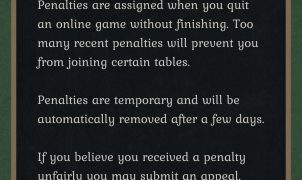100 Aces: refers to a meld consisting of four Aces, one of each suit. This meld is also referred to as Aces Around. Depending on the scoring method, this meld is worth either 10 or 100 meld points.
40 Jacks or 400 Jacks: refers to a meld consisting of four Jacks, one of each suit. This meld is also referred to as Jacks Around. Depending on the scoring method, this meld is worth either 4 or 40 meld points.
80 Kings or 800 Kings: refers to a meld consisting of four Kings, one of each suit. This meld is also referred to as Kings Around. Depending on the scoring method, this meld is worth either 8 or 80 meld points.
60 Queens or 600 Queens: refers to a meld consisting of four Kings, one of each suit. This meld is also referred to as Kings Around. Depending on the scoring method, this meld is worth either 8 or 80 meld points.
Aces Abound: refers to a meld consisting of eight Aces, two of each suit. This meld is also referred to as Double Aces. Depending on the scoring method, this meld is worth either 100 or 1000 meld points.
Aces Around: refers to a meld consisting of four Aces, one of each suit. This meld is also referred to as 100 Aces. Depending on the scoring method, this meld is worth either 10 or 100 meld points.
Bid: refers to the act of declaring the number of points a player believes they can earn by combing melds and winning tricks during the hand. A bid represents a player’s confidence in their hand and their estimation of the potential points they can accumulate.
When it is a player’s turn to bid, they have the option to pass or place a bid. There is typically a minimum bid such as 20 or 25 points, and subsequent bids must be higher than the previous bid. Bids are typically made in increments of 1 points. For example, a player may bid 20, 21, 22, and so on.
The maximum bid in Pinochle is typically 100 points, although some variations of the game may have different maximum bid limits. Once a bid has been made, other players have the opportunity to either make a higher bid or pass. The player who makes the highest bid becomes the declarer and must then try to fulfill their bid by earning the declared number of points during the hand.
If the declarer fails to meet their bid, they lose the number of points they bid. On the other hand, if the declarer succeeds in earning the declared number of points or more, they receive the points they bid, and any additional points earned are also added to their score. A bid in Pinochle represents a player’s estimate of the points they can win, and it determines the target for the hand. It adds an element of strategy and risk assessment to the game.
Bare Run: refers to a run with now extra Kings or Queens. See Run.
Book: refers to the 4 cards that are taken at the end of a trick turn. The player who wins the trick gets to take the cards, known as a book, and gets one point for each card that is an Ace, Ten, or King. See Trick.
CABS: acronym for Currently Accepted Bidding System.
Common Marriage: refers to any marriage in a non-trump suit. See Marriage.
Counters: refers to cards that are worth one point when taken in a trick, including Aces, Tens, and Kings. Also referred to as pointers.
Crosscut – Partners cutting different suits:
Cut: when a player plays a trump card in a trick that was started with a non-trump card.
Declarer: the player who wins the bidding and gets to decide (or declare) which suit will be the trump suit in the hand.
Double Aces: refers to a meld consisting of eight Aces, two of each suit. This meld is also referred to as Aces Abound. Depending on the scoring method, this meld is worth either 100 or 1000 meld points.
Double Deck: refers to playing Pinochle with two decks, instead of one, typically removing all of the Nines, playing with four Aces, Tens, Kings, Queens, and Jacks of each suit.
Double Jacks: refers to a meld consisting of eight Jacks, two of each suit. This meld is also referred to as Jacks Abound. Depending on the scoring method, this meld is worth either 40 or 400 meld points.
Double Kings: refers to a meld consisting of eight Kings, two of each suit. This meld is also referred to as Kings Abound. Depending on the scoring method, this meld is worth either 80 or 800 meld points.
Double Queens: refers to a meld consisting of eight Queens, two of each suit. This meld is also referred to as Queens Abound. Depending on the scoring method, this meld is worth either 60 or 600 meld points.
Double Run: refers to a meld consisting of 2 runs in the same suit (2 Aces, 2 Tens, 2 Kings, 2 Queens, and 2 Jacks, all in the same suit). Depending on the scoring method, this meld is worth either 150 or 1500 meld points.
Double Pinochle: refers to a meld consisting of 2 Pinochles (2 Queen of Spades and 2 Jack of Diamonds). Depending on the scoring method, this meld is worth either 30 or 300 meld points.
Duck: refers to the act of holding back and purposely not playing a card that the player knows will win a trick.
Follow suit: refers to the rule that players must play a card from the same suit as the leading card (the first card played in the trick) if they have any cards of that suit in their hand.
Here’s how it works:
- The player who leads the trick plays a card from their hand, placing it face-up on the table. This card determines the suit that other players must follow.
- If a player has any cards of the same suit as the leading card, they must play a card from that suit. They can choose any card from that suit in their hand.
- If a player doesn’t have any cards of the leading suit, they are allowed to play any card from their hand, including a card from a different suit or a trump card (if trump is declared).
- The player who plays the highest-ranking card of the leading suit, or the highest-ranking trump card if any trump cards have been played, wins the trick and collects the cards from the table.
Hand: can either refers to the hand of cards that are dealt to each player at the beginning of a round, or can also refer to the entire round of Pinochle, completed after all tricks cards are played.
Head Rub: refers to when a team or single player wins all trick points in a round, meaning the opposing team or players get no points in the round.
Jacks Abound: refers to a meld consisting of eight Jacks, two of each suit. This meld is also referred to as Double Jacks. Depending on the scoring method, this meld is worth either 40 or 400 meld points.
Jacks Around: refers to a meld consisting of four Jacks, one of each suit. This meld is also referred to as 40 Jacks. Depending on the scoring method, this meld is worth either 4 or 40 meld points.
Jump bid: refers to the act of bidding 10 points or more over the previous bid.
Kings Abound: refers to a meld consisting of eight Kings, two of each suit. This meld is also referred to as Double Kings. Depending on the scoring method, this meld is worth either 80 or 800 meld points.
Kings Around: refers to a meld consisting of four Kings, one of each suit. This meld is also referred to as Kings Around. Depending on the scoring method, this meld is worth either 8 or 80 meld points.
Kitty: the term “kitty” refers to a portion of the deck that is set aside before the start of the game. The kitty typically consists of a predetermined number of cards, which are often determined by the rules or variations being played.
The kitty serves various purposes in Pinochle, depending on the specific rules being followed. In some variations, the kitty is used to replenish the players’ hands during the game. For example, if a player’s hand is reduced to a certain number of cards, they can take cards from the kitty to reach the required minimum hand size. This can help players improve their hands or add strategic elements to the game.
In other variations, the kitty remains untouched until the end of the game. After all the tricks have been played, the player who wins the final trick also gets to take the kitty into their score. This can provide an additional bonus or penalty, depending on the contents of the kitty.
The exact rules surrounding the kitty can vary, as there are multiple variations and regional variations of Pinochle. It’s always best to clarify the specific rules being followed with the players you are playing with to ensure everyone is on the same page.
Lead: refers to the first card played in a trick. The lead card determines what suit the other players must follow suit.
Locked Suit: refers to the scenario when a player has the top cards in a suit, and therefore is guaranteed to win a trick of that suit, unless a trump is played.
Lone ace: refers to the scenario when a player has just one Ace in a particular suit, and no other cards of that suit. If a player doesn’t get a chance to play this card first, they risk losing it if another player throws another Ace of that same suit before them.
Make the bid: refers to when a player who wins the bidding is successful in earning enough points to cover their bid.
Marriage: refers to a meld consisting of a Kings and a Queen of the same suit. Depending on the scoring method, this meld is worth either 2 or 20 meld points. If the marriage is in the trump suit then is worth twice as many points. See Trump Marriage.
Meld: refers to the process of creating specific combinations or sets of cards from a player’s hand and laying them face-up on the table. These combinations, known as melds, earn points for the player. Before the trick-taking phase begins, players have an opportunity to meld cards from their hand. Melds contribute to a player’s overall score. Once the melding phase is complete, the melded cards are set aside, and the trick-taking phase begins. The melded points are added to a player’s score at the end of the hand.
Minimum Bid: refers to the starting bid amount or minimum amount that a player can bid.
Minimum Tricks: refers to the minimum number of trick points that a team or player must receive in order to keep their meld points in a round.
Must Bid to Win: refers to a rule that stipulates a team or player cannot win the game unless they bid on their last hand of the game, even if their score is higher than the total points needed to win the game.
Non-counters: refers to cards that have no trick point value, including Nines, Jacks or Queens. Taking these cards in a trick won’t add any points to the player’s score.
Overbid: refers to the act of bidding higher than a player should have, resulting in the player failing to earn enough points to cover their bid, thus forfeiting all meld and trick points earned in the round and having the bid amount subtracted from their score.
Overcut: refers to when a player wins a trick by playing a trump card in a trick that was led by a non-trump card, and then “cut” by another player with a trump, but ultimately won by playing a higher trump card. See Cut.
Pair: refers to a meld consisting of a Kings and a Queen of the same suit. This is another name for a marriage. Depending on the scoring method, this meld is worth either 2 or 20 meld points. If the marriage is in the trump suit then is worth twice as many points. See Marriage.
Pass: refers to the act of declining to bid or to give up during the bidding phase to allow another player to win the bidding.
Pinochle: refers to a special meld consisting of a Queen of Spades and a Jack of Diamonds. Depending on the scoring method, this meld is worth either 4 or 40 meld points.
Pointers: refers to cards that are worth one point when taken in a trick, including Aces, Tens, and Kings. Also referred to as counters.
Points: refers to the numerical value assigned to cards and various combinations of cards that contribute to a player’s score. Points are used to keep track of the score during the game and determine the winner.
Queens Abound: refers to a meld consisting of eight Queens, two of each suit. This meld is also referred to as Double Queens. Depending on the scoring method, this meld is worth either 60 or 600 meld points.
Queens Around: refers to a meld consisting of four Queens, one of each suit. This meld is also referred to as 60 Queens. Depending on the scoring method, this meld is worth either 6 or 60 meld points.
Round: refers to the sequence of game play starting with a deal, followed by the bidding phase, the melding phase, and the trick-taking phase. Sometimes also referred to as a hand. There are typically several rounds or hands in a game before a team or player earn enough points to win the game. See Hand.
Roundhouse: refers to a meld consisting of 4 marriages, each of different suits. The meld points are calculated by adding the points of the fours Kings (8 or 80), plus the four Queens (6 or 60), plus the points for each non-trump marriage (6 or 60), plus the points of the trump marriage (4 or 40 points) for a total of 24 or 240 points.
Royal Marriage: refers to a marriage in the trump suit. Also known as a Trump Marriage.
Run: refers to a meld consisting of an Ace, Ten, King, Queen, and a Jack, all of the same suit. Depending on the scoring method, this meld is worth either 15 or 150 meld points.
Run-up the Bid: refers to the act of continuing to bid higher and higher, even though a player doesn’t actually have a strong hand, to force opponents to bid as high as possible, hoping opponents will ultimately win the bidding but won’t earn enough points to make the bid.
Sandbag: refers to the act of saving stronger cards such as Aces or Tens early in the round, holding them back until later in the round, hoping to use them to earn more pointers.
Set: refers to when the team or players who don’t win the bidding are successful in preventing the high bidding team or player from making the bid, often by playing tricks strategically to direct pointer cards away from the high-bidder.
Shooting the Moon: refers to a risky bidding strategy where a player attempts to bid and win all the tricks in a hand. It is an aggressive approach that involves bidding the highest possible number of points (usually 100 or 1000) with the goal of winning all the tricks and earning a substantial number of points.
Slough [pronounced “sluff”]: refers to the act of throwing “any” card a player wants because they are unable to follow suit, meaning they have no cards in the suit that was led, and no trump cards, so they are able to play any card they want.
Split Deck: refers to when trick points are split equally between teams, generally can only occur in double deck, when each team earns 25 trick points.
Suit: refers to one of the four categories or groups of cards in a standard deck of playing cards. The four suits are hearts, diamonds, clubs, and spades. In a standard Pinochle deck, each suit consists of 12 cards: two Aces (A), two Tens (10), two Kings (K), two Queens (Q), two Jacks (J), and two Nines (9). In Pinochle, suits play a crucial role when it comes to following suit during the trick-taking phase. Players are required to play a card from the same suit as the leading card if they have any cards of that suit in their hand.
Take the Rest: refers to the occurrence when a player knows that it is a certainty that they will win all of the remaining tricks in a hand. For example if a player is holding all trump cards and/or Aces, and knows that the remaining trump cards have already been played. Rather than continuing to play out remaining tricks the player can take the rest of the cards and tally trick points from pointers collected.
Trick: refers to a round of cards played during the trick-taking phase of the game. A trick consists of cards played by each player in clockwise order, and the highest-ranking card of the leading suit or the highest-ranking trump card wins the trick.
- Leading Card: The player who leads the trick plays a card from their hand by placing it face-up on the table. The suit of this leading card determines the suit that other players must follow, unless they play a trump card.
- Following Suit: In Pinochle, players are generally required to follow suit if they have any cards of the leading suit in their hand. This means they must play a card of the same suit as the leading card if possible.
- Trump Cards: If a player doesn’t have a card of the leading suit, they can play a trump card instead. Trump cards have a higher rank and can beat cards from other suits. The highest-ranking trump card played wins the trick.
- Winning the Trick: After all players have played a card, the player who played the highest-ranking card of the leading suit or the highest-ranking trump card wins the trick. They collect the cards played during the trick and add them to a won tricks pile in front of them.
- Leading the Next Trick: The player who won the previous trick leads the next trick by playing a card from their hand. The process of playing cards, following suit or playing trump, and determining the winner of each trick continues until all the cards in the hand have been played.
It’s important to note that the trick-taking phase in Pinochle is preceded by the melding phase, where players lay down specific combinations of cards for points. The melded points are separate from the trick points and contribute to the overall score of the hand.
Trump: refers to a suit that is designated to have a higher value than the other suits for a particular hand. The trump suit has the power to beat cards from other suits during the trick-taking phase.
Trump Marriage: refers to a marriage in the trump suit. Also known as a Royal Marriage. Trump Marriages are worth twice as much as a non-trump marriage (4 or 40 points).
Twenty-Pounder: refers to a meld consisting of a Run (worth 15 points) with an additional trump marriage (worth 4 points) worth a total of 20 points.
Void: refers to the situation where a player has no cards in a particular suit. This can be advantageous if a player is holding cards in the trump suit, as it means when a card is played in the suit the player has a void, they won’t be required to follow suit and can instead play a trump card to win the trick.
Widow: the term “widow” refers to a special hand dealt face down on the table that is used in certain variations of the game. The widow is separate from the regular hands dealt to each player and is typically composed of a specific number of cards determined by the rules being followed.
The widow serves as an additional element in the game, introducing an element of chance and strategy. After the players have received their initial hands, there may be an opportunity for players to bid or exchange cards with the widow. This depends on the specific variation of Pinochle being played.
For example, in some versions of Pinochle, players may have the option to bid on the widow. The highest bidder gets to exchange cards from their hand with the widow, improving their hand or adjusting their strategy. This can be an opportunity to strengthen one’s hand by acquiring more desirable cards or discarding unwanted ones.
The widow can add excitement and unpredictability to the game, as players compete for the chance to improve their hands and potentially gain an advantage. The specific rules and mechanics involving the widow may vary depending on the region or variant of Pinochle being played, so it’s always important to clarify the rules with the other players before beginning a game. See Kitty.



















































































































